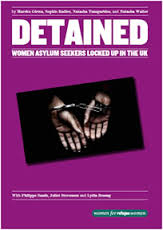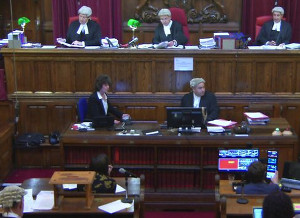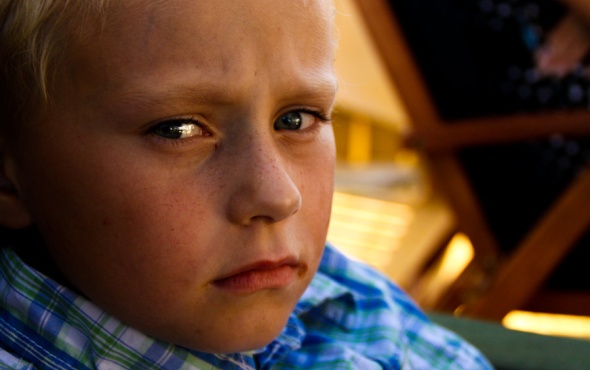In this post:
Women for Refugee Women’s new report on the detention of asylum-seeking women
Court of Appeal judgment on detention of seriously mentally ill migrants
Continued detention of children, Cedars and Barnardos
Detention of refugee women
 Last week, Women for Refugee Women launched its new report, Detained: women asylum seekers locked up in the UK. The research is based on interviews with 46 women who had sought asylum and had been detained, mainly in Yarl’s Wood Immigration Removal Centre. The report was covered in the Mirror newspaper, whose columnist wrote:. “Our duty to refugee women is to care – not lock them up and treat them like criminals”, and the Independent: “Handling of female asylum seekers ‘puts UK to shame’”.
Last week, Women for Refugee Women launched its new report, Detained: women asylum seekers locked up in the UK. The research is based on interviews with 46 women who had sought asylum and had been detained, mainly in Yarl’s Wood Immigration Removal Centre. The report was covered in the Mirror newspaper, whose columnist wrote:. “Our duty to refugee women is to care – not lock them up and treat them like criminals”, and the Independent: “Handling of female asylum seekers ‘puts UK to shame’”.
The report is further damning evidence of the destructive nature of immigration detention – hard facts that policy makers cannot and should not ignore:
- An overwhelming number of the women whose experiences are included in the report had experienced rape or torture (71% said they had been raped; 41% reported having been tortured).
- Almost all the women reported feeling depressed in detention, and more than one in five of the women interviewed had attempted suicide.
- The women interviewed had been detained for many months, some for nearly a year (and previous research from Detention Action has shown even longer average detention periods, sometimes for years).
- The women interviewed had been guarded by male guards. This had, at the very least, made them feel uncomfortable and some women reported verbal abuse, physical abuse and, in one case, sexual assault. At a meeting with Crossroads and Legal Action for Women last year, NCADC heard ex-detainees speak of male guards entering their rooms without warning, even when the women detainees were in a state of undress or not wearing their hijbab.
- Home Office statistics show that of the 1,867 women who sought asylum and left detention in 2012, only 36% were removed from the UK. Immigration detention, by law, is only meant to be used when forced removal/deportation is imminent. Women for Refugee’s report suggests that this unnecessary detention has an ongoing impact on the mental health of vulnerable women.
The report’s recommendations are:
- Women who have experienced rape, sexual violence and other forms of torture should not be detained. If an individual raises these experiences at any point in her asylum claim, she should be released to continue her case in the community.
- There should be no male staff employed in roles where they come into contact with women detainees at Yarl’s Wood Immigration Removal Centre.
- Pregnant women should not be detained under any circumstances.
- If a woman must be detained prior to removal, this should be for the shortest possible time and only after alternatives to detention have been meaningfully considered. There should be an upper time limit of 28 days on all immigration detention, after which people should be released on temporary admission for their cases to be considered in the community.
- All individuals held in detention should be able to access free, quality legal advice throughout their stay in detention.
- There are such serious flaws in the Detained Fast Track screening process and in asylum seekers’ ability to get a fair hearing in the fast track that this process should be ended
Survivors of rape and torture should not be detained, even according to the Home Office’s own policy. This includes detention within the Detained Fast-Track System, in which cases are generally processed very quickly with even less access to justice than in the rest of the asylum system.
Detention of the mentally ill
 In another example of the Home Office breaking its own rules on detention, an important judgment was reached by the Court of Appeal (released on 28 January) on the detention of immigrants with serious mental health problems.
In another example of the Home Office breaking its own rules on detention, an important judgment was reached by the Court of Appeal (released on 28 January) on the detention of immigrants with serious mental health problems.
The judgment, on the case of ‘The Queen (on the application of Pratima Das) v Secretary of State for the Home Department) and (1) Mind (2) Medical Justice (Interveners) [2014] EWCA Civ 45′, follows a series of five cases in two years in which it was found the Home Secretary had breached the European Convention of Human Rights (Article 3) by detaining a severely mentally ill individual.
This case was brought on behalf of Ms Das, an Indian national who came to the UK as an overseas domestic worker, who later claimed she was a victim of trafficking and sought asylum in 2008. In 2009 she was diagnosed as having moderate depression, Post Traumatic Stress Disorder (PTSD) and a mild learning disorder for which she received treatment and medication. Her asylum claim and appeal against removal were dismissed in 2010, and, in 2011, a decision was made to detain Ms Das pending removal. This was without considering a consultant psychiatrist’s report about her condition.
When detained Ms Das provided evidence of her medication and psychiatric appointments, and a risk assessment identified a risk of self-harm and suicide. In detention, she received medication, was assessed as “fit to fly” and was eventually removed.
The case challenged the High Court Judge’s interpretation of Home Office policy on the detention of immigrants with mental health problems, which states that “those suffering from a serious mental illness which cannot be satisfactorily managed within detention” can only be detained in “very exceptional circumstances.”
The Court of Appeal overturned the High Court decision that:
- ‘Serious’ requires hospitalisation or detention under the Mental Health Act. This was challenged on the basis that management of serious mental health problems is not necessarily done in a hospital setting and that such an interpretation makes it more difficult for people to fall within the protection of the policy.
- ‘Satisfactory management’ means treatment that would prevent a detainee from becoming so unwell they would be unable to cope with ordinary life. This was challenged because interpreting ‘satisfactory management’ as allowing someone’s health to deteriorate to the point where they need to be hospitalised is inappropriate.
The Court of Appeal accepted that the High Court judge had erred in his approach to the medical evidence and that the imminence of removal and the risk of absconding did not meet the “high hurdle” for detaining those with a serious mental illness under the policy.
 Alison Fiddy, Head of Legal at Mind, the mental health charity who intervened in the case along with Medical Justice, said:
Alison Fiddy, Head of Legal at Mind, the mental health charity who intervened in the case along with Medical Justice, said:
This is an important decision that gives much-needed clarity on Home Office policy and will help to protect the human rights of people who are unwell. We welcome the approach taken by the Court of Appeal in recognising that the treatment of serious mental health problems is no longer restricted to hospital settings.
 Emma Mlotshwa, co-ordinator of Medical Justice, said:
Emma Mlotshwa, co-ordinator of Medical Justice, said:
We intervened in this case because of our growing concern about the number of mentally ill people who are held in immigration detention for lengthy periods, without access to appropriate treatment. Doctors volunteering with Medical Justice have seen scores of men and women whose pre-existing mental illness has significantly deteriorated whilst held in immigration detention indefinitely. Some detainees have become mentally ill in detention.
In a joint statement, solicitors for the interveners, Hamish Arnott of Bhatt Murphy (representing Mind) and Sue Willman of Deighton Pierce Glynn (representing Medical Justice), said:
This decision makes it crystal clear that the Home Office will be acting unlawfully if it ignores mental ill-health when detaining vulnerable migrants. Mental health and the impact of detention on mentally ill detainees are also relevant to the length of time for which a person may be detained.
Detention of children
Also on the theme of detaining vulnerable individuals, the New Internationalist has continued its interest in immigration detention issues with a blog post this week on continued child detention.
In ‘The promise to end child detention in the UK – and how it was ruined’, Tom Sanderson writes of his frustration with Barnardo’s refusal to terminate its involvement in ‘state-sponsored cruelty’:
The numbers of children in immigration detention have been significantly reduced when compared to the appalling figures under New Labour, but the government is still detaining children under immigration law for administrative convenience. As long as it continues, politicians are destroying the lives of scores of children, not to mention ensuring that the spectre of detention overshadows the lives of many more…
Barnardo’s have proven reluctant to speak out about any events witnessed at Cedars, despite the widely condemned use of force against children and pregnant women, which was only belatedly prohibited due to a looming high court challenge. Before this, the Home Office had no published policy on such use of force at Cedars, since it was not covered by immigration detention centre regulations. This left Cedars as a regulatory vacuum and in some respects, children there were afforded less rights than they had at the much criticized Yarl’s Wood detention centre.
One ‘red line’ specifically states that Barnardo’s will withdraw their services if there are more than two instances when ‘any family has stayed at the pre-departure accommodation more than once’. The first report by the HMIP found six such occurrences.
Read the full piece here.

